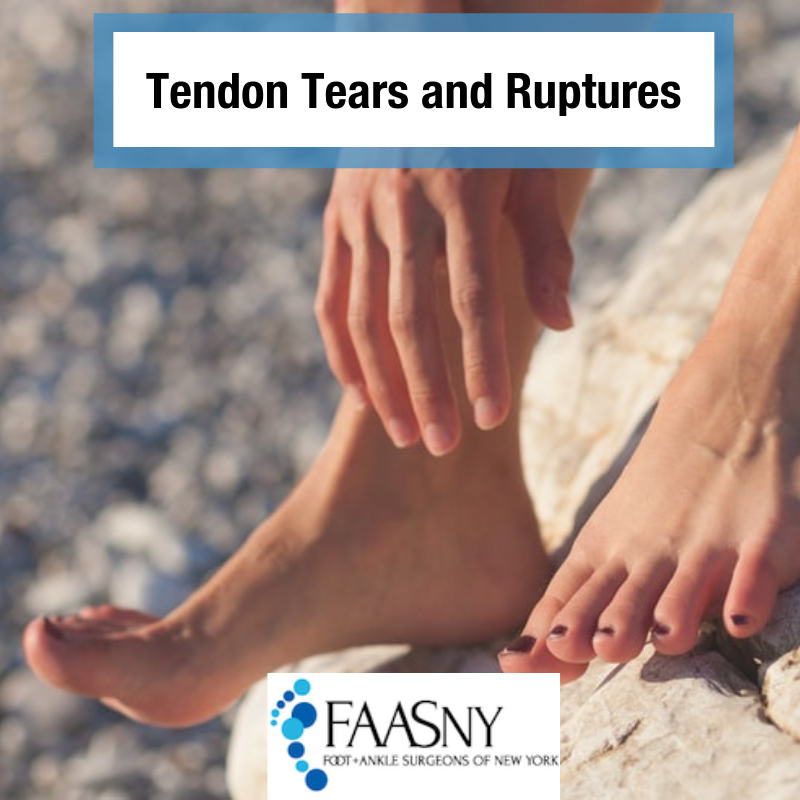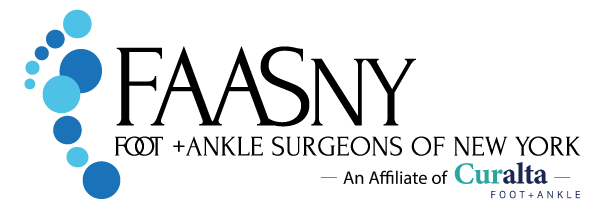
Tendons are the strong fibers that unite tissue to bone. Sometimes, tendons snap, split, or break. If this does occur, it can be very serious and result in unbearable discomfort, known as a tendon tear or rupture. One of the most common tendons to experience ruptures or tears within your body is in your Achilles. It is located in the back of your foot, above your heel. It is the spot that connects your calf muscle to the heel of your foot. Without your Achilles, you would not be able to stand on your tiptoes or push off of your foot, especially while running. If you have experienced a tear or rupture in your Achilles, it is time to seek out the help of a medical professional, like those at Foot and Ankle Surgeons of New York.
Common Symptoms:
The symptoms that come along with an Achilles tendon tear or rupture can be very uncomfortable. For example, if you have recently torn or ruptured your Achilles tendon, it is unlikely that you will be able to walk comfortably. The general symptoms, you may also experience, of a tendon tear or rupture include:
- Severe pain and stiffness
- Bruising
- A snap or pop
- Unable to move or use the area
- Weakness of area
- Maybe swollen or red
What can cause a tear or rupture?
General causes of a rupture or tear in the tendon include:
- Age – as you grow older, your tendons weaken, making it easier for them to be injured.
- Direct trauma
- Strenuous activity
- An excessive amount of strain on your weight-bearing foot.
Other common causes include the regular usage of antibiotics, as well as repetitive motions due to your job, sports, or just life in general.
How to determine if you are injured?
Leaving a tendon tear or rupture untreated could lead to more serious issues in the future. When visiting a podiatrist, they will likely conduct a physical examination of the injured tendon to determine what the next best treatment option is for you. Listed below are common test options used to help your doctor determine what comes next:
- Thompson Test – During this test you will kneel on a chair while dangling your foot off the edge. A doctor will then apply pressure or squeeze a certain area on your calf – if your toes do not point downward during the squeeze then it is likely you have a ruptured Achilles tendon.
- Blood Pressure Cuff Test – A doctor places a blood pressure cuff on your calf and will inflate it to about 100 mm Hg. While inflated, your doctor will adjust your foot to be in the toes-up position. The amount the pressure increases will determine whether or not your tendon is intact.
- X-ray – If a doctor takes an x-ray, they’ll look to see if it shows a darkening of the space in front of your Achilles tendon or if the tendon appears to be thicker.
- MRI or Ultrasound – These tests can be used to determine how serious your tear or rupture is.
Treatments:
Treating a tendon rupture or tear can be done both surgically and nonsurgically. Your doctor will determine which option is best for you based on the severity of the rupture or tear, as well as how active of a lifestyle you live and the status of your overall health.
- Nonsurgical – People who have suffered a minor rupture, less active, or suffer from a medical condition that prevents them from getting surgery are most likely to receive this form of treatment. This can include wearing a cast, brace, or walking boot.
- Surgical – Surgery is the best option for preventing re-rupture. With various forms of surgical procedures, you can increase your push-off strength, muscle function, and ankle movement.
- Physical Therapy – While technically, PT can be considered a nonsurgical treatment, it is important to highlight how beneficial it is when treating a tendon rupture. It can help the healing process whether you received nonsurgical or surgical treatment.
At Foot and Ankle Surgeons of New York, we offer expert treatment for everything from foot and ankle trauma to surgery. If your rupture or tear is severe, we have podiatric surgeons on staff who specialize in the lower extremity. Our surgeons will properly hold an evaluation and assess if surgery is the proper treatment plan for you. Visiting FAASNY will help give you the answers you need for optimal recovery!
